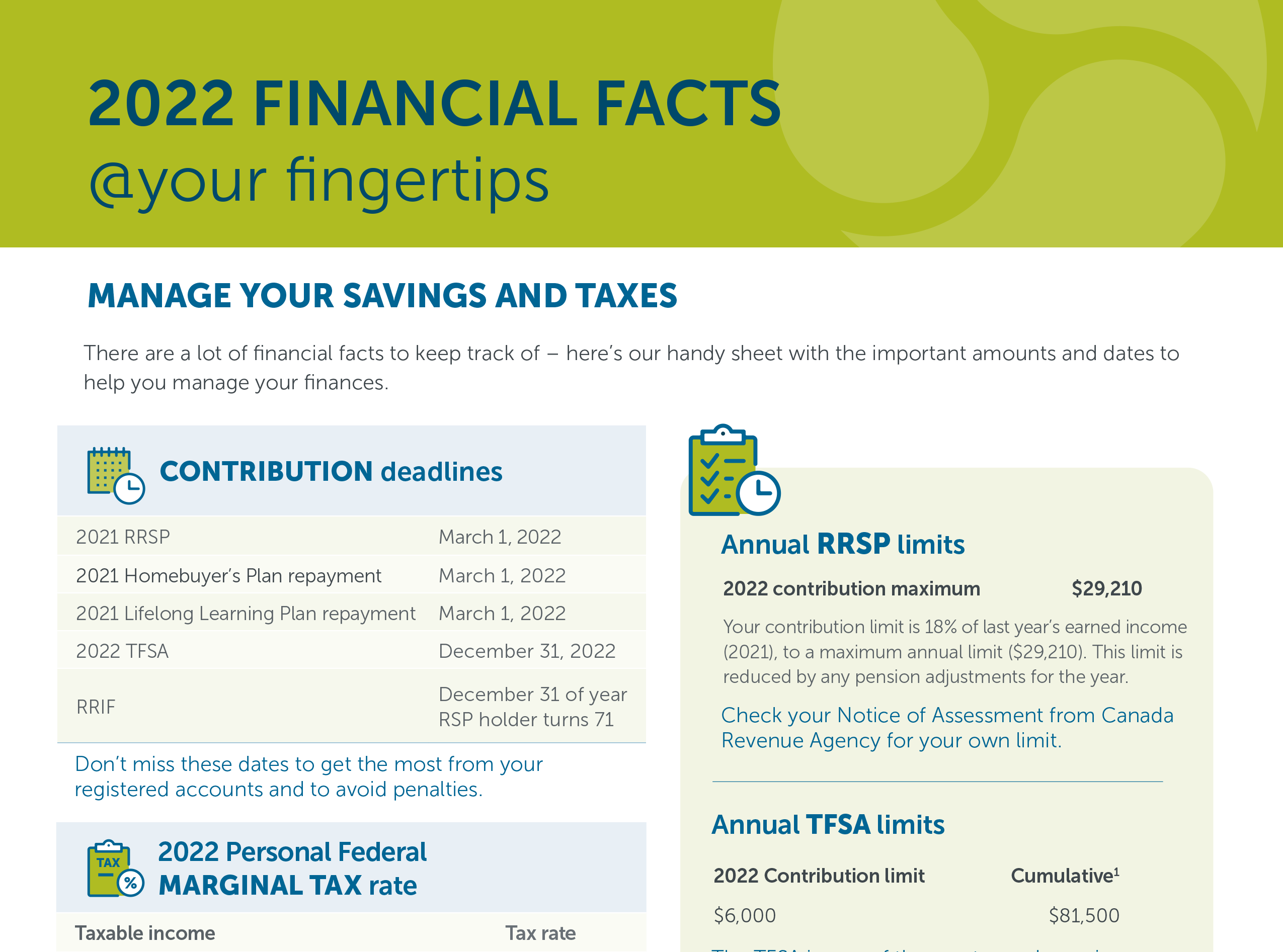2022 Financial facts @ your fingertips

2022 FINANCIAL FACTS
@your fingertips
Manage your savings and taxes
There are a lot of financial facts to keep track of – here’s our handy sheet with the important amounts and dates to help you manage your finances.
![]() Download the PDF
Download the PDF
![]() Live in Quebec? Download the PDF
Live in Quebec? Download the PDF
 CONTRIBUTION deadlines
CONTRIBUTION deadlines
2021 RRSP
March 1, 2022
2021 Homebuyer’s Plan repayment
March 1, 2022
2021 Lifelong Learning Plan repayment
March 1, 2022
2022 TFSA
December 31, 2022
RRIF
December 31 of year RSP holder turns 71
Don’t miss these dates to get the most from your
registered accounts and to avoid penalties.
 2022 Personal Federal
2022 Personal Federal
MARGINAL TAX rate
Taxable income
Tax rate
$0 to $14,398
0%
$14,399 to $50,197
15.0%
$50,198 to $100,392
20.5%
$100,393 to $155,625
26.0%
$155,626 to $221,708
29.38%
over $221,708
33.0%
Add your provincial marginal tax rates to get your
combined tax rate.
 GROWTH in a tax-deferred plan
GROWTH in a tax-deferred plan
after 10 years*
Monthly deposit
3% rate of return
5% rate of return
$50
$6,987
$7,764
$100
$13,974
$15,528
$200
$27,948
$31,056
Register for a pre-authorized deposit plan for your
RRSP or TFSA and help your nest egg grow.
 Annual RRSP Limits
Annual RRSP Limits
2022 contribution maximum
$29,210
Your contribution limit is 18% of last year’s earned income (2021), to a maximum annual limit ($29,210). This limit is reduced by any pension adjustments for the year.
Check your Notice of Assessment from Canada Revenue Agency for your own limit.
Annual TFSA limits
2022 Contribution limit
Cumulative 1
$6,000
$81,500
The TFSA is the most popular savings, investment and retirement account in Canada.
LUMP-SUM PAYMENT
withholding taxes
All provinces except Quebec
Up to $5,000
10%
$5,001 – $15,000
20%
Over $15,000
30%
These taxes will be withheld at source from funds withdrawn from your RRSP, and from withdrawal amounts above your RRIF minimums. For nonresidents of Canada, the withholding tax rate is 25%, but can be reduced by a tax treaty.
 MANAGE YOUR RETIREMENT INCOME
MANAGE YOUR RETIREMENT INCOME
CANADA PENSION PLAN (CPP)
monthly benefits
For January – December 2022
Average
Maximum
Retirement pension at age 65
$702
$1,253
Disability pension
$1,050
$1,457
Survivors’ benefit younger
than 65
$461
$524
Survivors’ benefit age 65+
$307
$752
Death benefit – one time payment
$2,495
$2,500
Yearly maximum pensionable
earnings (2022)
$64,900
CPP provides contributors and their families with partial replacement of earnings in the case of retirement, disability or death. You have to apply for the CPP retirement benefit – it doesn’t start automatically.
OLD AGE SECURITY (OAS)
monthly pension
For January-March 2022
Maximum
Pension at age 65
$642
Minimum Net Income Recovery threshold
$81,761
OAS pension recovery tax
15% of excess
over threshold
It’s important to watch your annual net income, as the OAS recovery tax begins for net income over the threshold. Seniors aged 75+ will see an automatic 10% increase of their OAS pension, as of July 2022.
GUARANTEED INCOME SUPPLEMENT (GIS) monthly benefit
For January-March 2022
Maximum
Maximum if single, widowed, divorced, or if your spouse does not receive OAS pension
$959
Maximum if spouse receives OAS
pension or Allowance
$577
In addition to the OAS pension, low income Canadians may be eligible for GIS. Starting December 2017, eligible seniors are automatically enrolled.
Talk to your advisor for more advice and information on managing your finances.
Age
RRIF/LIF
Minimum
Payment
60
3.33%
61
3.45%
62
3.57%
63
3.70%
64
3.85%
65
4.00%
66
4.17%
67
4.35%
68
4.55%
69
4.76%
70
5.00%
71
5.28%
72
5.40%
73
5.53%
74
5.67%
75
5.82%
76
5.98%
77
6.17%
78
6.36%
79
6.58%
80
6.82%
81
7.08%
82
7.38%
83
7.71%
84
8.08%
85
8.51%
86
8.99%
87
9.55%
88
10.21%
89
10.99%
90
11.92%
91
13.06%
92
14.49%
93
16.34%
94
18.79%
95 +
20.00%
This is the minimum you must withdraw every year from your RRIF/LIF (% of the market value).
* For illustration purposes only. Assumes monthly contributions made at the beginning of the period and compound annual returns.
1 This total applies to people who have been eligible to contribute to this plan since inception and have never made a withdrawal. The
amount may be higher for individuals who made a withdrawal and wish to make a contribution in a year following the withdrawal.
Sources: Canada Revenue Agency, Government of Canada, Statistics Canada. This document is for information purposes only and is not meant to provide legal, financial, tax, or any other advice. Although care was taken in the preparation of this document, The Empire Life Insurance Company assumes no responsibility for any reliance on or misuse or omissions of the information contained in this document and cannot be held responsible for damages or losses arising from the use of this information. Please seek professional advice before making any decisions.
This blog reflects the views of the author as of the date stated. This information should not be considered a recommendation to buy or sell nor should it be relied upon as investment, tax or legal advice. Empire Life and its affiliates does not warrant or make any representations regarding the use or the results of the information contained herein in terms of its correctness, accuracy, timeliness, reliability, or otherwise, and does not accept any responsibility for any loss or damage that results from its use.
February 2022











